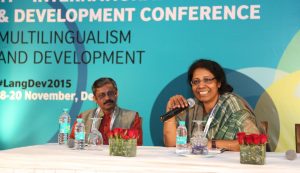 Editor’s note: This piece is shared with TIRF readers by Libby Karangwa-Miles, LDC2017 Conference Director, British Council. Photos below are from previous LDC conferences and are credited to the British Council.
Editor’s note: This piece is shared with TIRF readers by Libby Karangwa-Miles, LDC2017 Conference Director, British Council. Photos below are from previous LDC conferences and are credited to the British Council.
“As we are an organisation committed to diversity and to intercultural understanding, then respect and appreciation of different languages is something that we naturally support,” said John Knagg (Head of Research and Consultancy for English, British Council), when asked about the significance of the 12th Language and Development Conference (LDC2017) to the organisation and to the cultural relations work that it carries out worldwide. “We are also concerned that groups are too often excluded from access to information, education, and other services by not being competent in certain languages. We believe in the value of multilingualism in society and in education, and we feel that this conference is an important contribution to a better understanding of the importance of language in development generally”. The global conference, hosted by the British Council in Senegal, which will attract up to 300 participants from around the world, will be held in Dakar from 27 to 29 November this year.
The series of international conferences, which take place every two years, always in a new location, seeks to highlight the crucial role and impact of language policies and practices in development initiatives across the globe, while seeking to share best practices and explore new approaches. The theme of this year’s conference is based on the new Sustainable Development Goals introduced in 2015, with a focus on equipping young generations through inclusive and equitable education, training workforces with appropriate skills for sustainable economic growth, and working towards creating inclusive, peaceful and just societies whether in post-conflict situations, urban or rural dwellings, or in migrant contexts.
This year, the British Council has been working alongside several partner organisations to design, plan for and deliver this exciting conference. UNESCO, the UK’s School of Oriental and African Studies (SOAS), the Council for Development of Social Science Research in Africa (CODESRIA), and SIL Africa are all involved, as well as the host government through Senegal’s Ministries of Higher Education and Research and National Education.
Supporting sustainable and equitable education for all, as a cornerstone of sustainable and inclusive economic and social development, is of course one of the main areas of focus for the conference to be held in West Africa. SIL Africa’s Ian Cheffy, Certified Senior Literacy and Education Consultant, stated that “Millions of children, young people and adults around the world are unable to achieve their potential because education is not available for them in the language they know best. LDC 2017 will provide an excellent opportunity for practitioners to share their insights and experience and to identify ways of achieving the vision of inclusive, equitable and quality education set out in the Sustainable Development Goals.”
Professor Friederike Lüpke of SOAS added that “formulating efficient and inclusive language policies for multilingual Africa remains a challenge for language-based approaches… . LDC 2017 has an important role to play in the development of new and inclusive methods of education overcoming (post)colonial models.”
The Call for Papers is currently open until June 7th. For any LDC-related questions, please write to [email protected]. We are looking forward to receiving contributions to the conference from experts, linguists and those working in education and skills development around the world as practitioners, planners or policy-makers.

